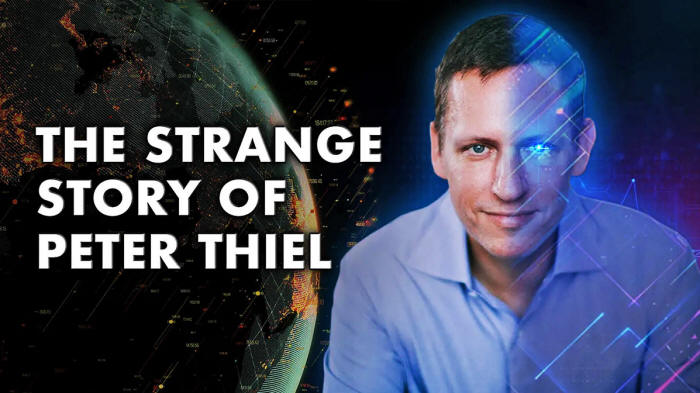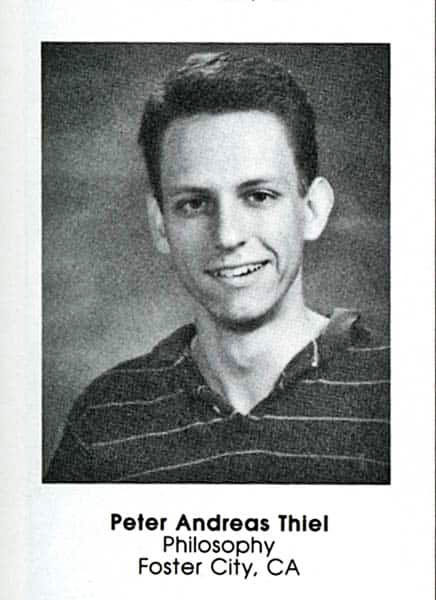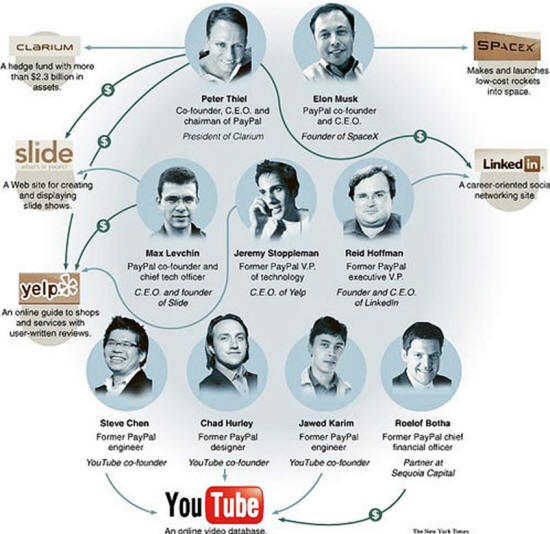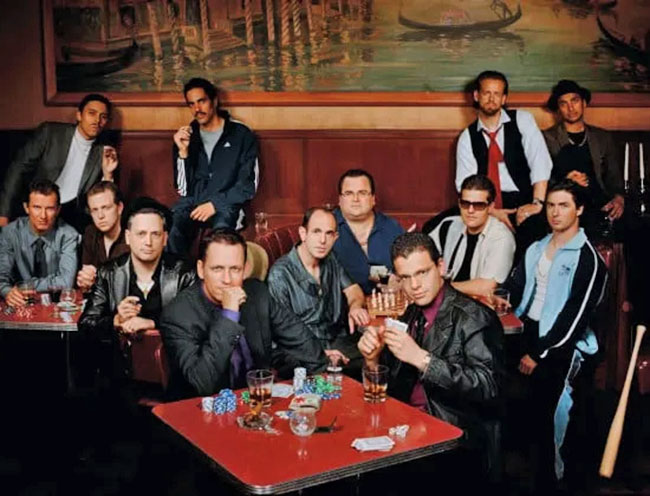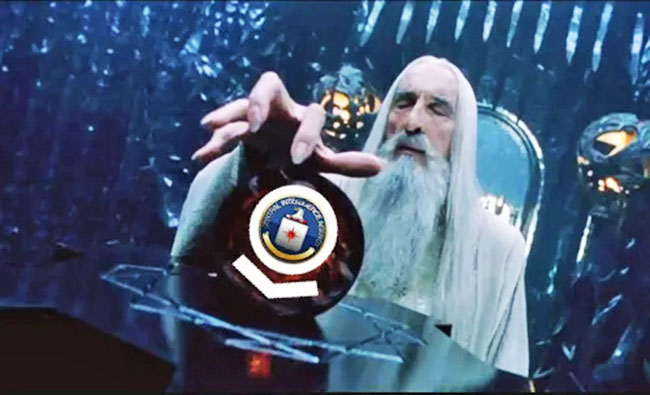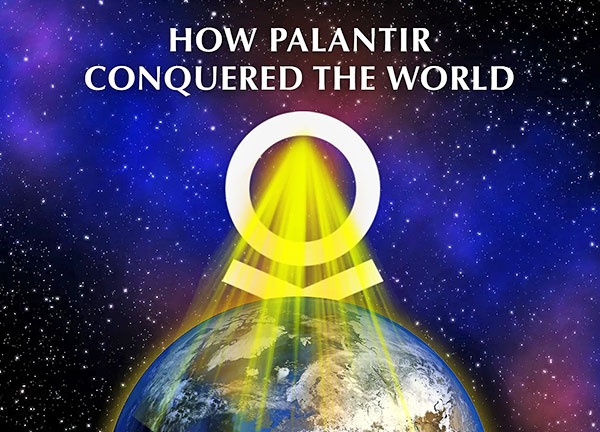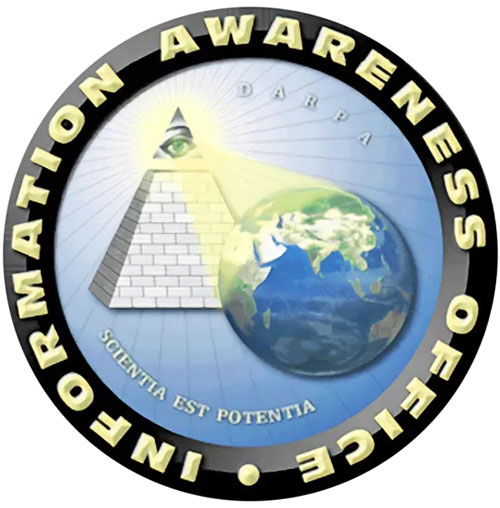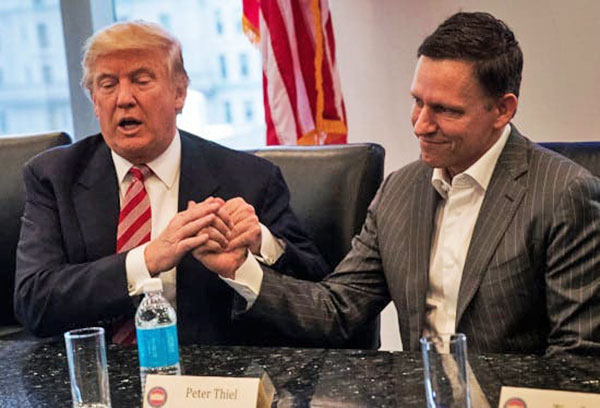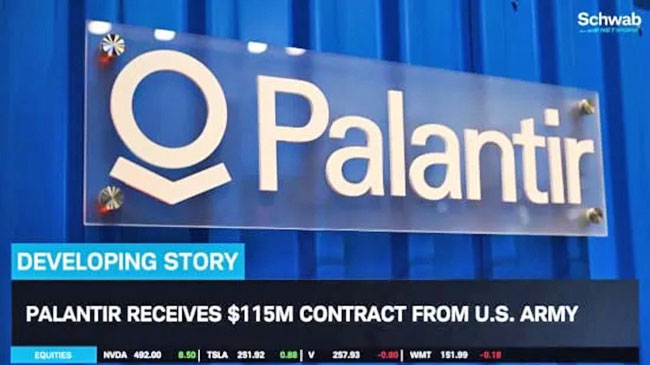|
by James Corbett
from
TheCorbettReport Website
October 20, 2024
What do you call someone who identifies as a
"vegetarian" but who consistently chows down on veal, mutton and
ribeye steaks? Whatever you call that person, it's not "vegetarian."
In reality, Thiel couldn't be further from the "radical libertarian" that he has claimed to be or from the anti-government crusader the establishment media outlets insist he is.
Indeed, after spending decades equipping the intelligence apparatus and the military forces of America, Israel and their allies with the most high-tech surveillance and targeting systems known to man, Thiel is now on the verge - thanks to his bought-and-paid-for lackey, J.D. Vance - of taking over the White House.
The truth, of course, is that Thiel is not a libertarian at all. He's not even the uptight Silicon Valley nerd who features in the occasional Wall Street Journal interview or New Yorker profile or Joe Rogan podcast.
Instead, Thiel - like Bill Gates - is an increasingly important wheeler-dealer in the global oligarchy, a hub from whom one can trace many spokes of the globalist agenda and discern the contours of the coming technocratic prison state.
This is The Strange Story of Peter Thiel...
The Early Years
Peter Thiel was born in Frankfurt, Germany, in 1967 but lived there
only briefly. In fact, given the propensity of his mining engineer
father, Klaus Friedrich Thiel, to be transferred to far-flung
corners of the globe for his work, young Peter didn't have a chance
to stay anywhere very long throughout his childhood.
Six years later, he uprooted the family again to take up work at a uranium mine in South West Africa (now Namibia), where he helped apartheid South Africa build a clandestine nuclear weapons program.
When the mine opened and the African labourers whom Thiel
père oversaw (and who had not been told they were building a uranium
mine) started dying of radiation poisoning, Klaus was on the move
yet again, first heading back to Cleveland and then to California,
where the Thiels finally settled in Foster City, a sleepy suburb of
San Mateo that is these days considered an adjunct of Silicon
Valley.
He was a Dungeons & Dragons enthusiast, a Lord of the Rings obsessive and a chess wunderkind who displayed no sense of humour, never smiled, had no close friends and was, perhaps unsurprisingly, relentlessly bullied and teased by classmates.
He was, however, possessed of a sense of his own greatness - he signed his classmates’ school yearbooks with the encouraging taunt, "Maybe you'll come within one point of me next year" - and demonstrated early on that he was willing to break whatever rules need to be broken in the pursuit of money, even if it meant putting his own future in jeopardy.
One of
his high school classmates asserts that, after securing a spot at
Stanford University, Thiel offered to take younger students' SAT
tests for them at a cost of $500 per test provided they could find a
way to "arrange untraceable payments," a scheme that could have cost
Thiel his own spot at Stanford were it discovered.
When he received a 4.0 GPA in his first term, he made a beeline for the only other 4.0 student he knew and proceeded to argue with him for ten minutes about why his own 4.0 was "better" than his classmate’s 4.0 because Thiel had received more A+ grades.
In his second semester, Thiel once swore while quoting a classmate. To commemorate the occasion, his roommate printed up a sign declaring "Under this spot, Peter Thiel first said the word fuck" and affixed the sign to the ceiling.
It stayed there until the end
of the semester, eliciting much laughter from the rest of his dormmates until it was finally pointed out to him, whereupon he tore
it down without a word.
Most of them ended up working for his first entrepreneurial venture, The Stanford Review, a monthly, tabloid-style newspaper he co-founded with Norman Book in 1987.
The
Review was intended to provide a conservative counterpoint to the
liberal Stanford Daily, the student-run broadsheet that had existed
since the university's founding in 1892.
Even so, according to Max Chafkin, Thiel's biographer, there are certain issues of the Thiel-era Review missing from the collection and campus rumor has it that,
Given the material still accessible in the existing archive, one has to wonder how bad the missing issues could be.
Still available for perusal at the library, for instance, is "The Rape Issue," in which Thiel associate David Sacks - who would go on to become COO of PayPal and a key alumni of the so-called "PayPal Mafia" - wrote an impassioned defense of Stuart Thomas, a Stanford senior whose graduation had been put in doubt after he pled no contest to the statutory rape of a freshman student.
In the pages of Thiel's Review, Sacks argued that statutory rape was a,
The issue also
included a convenient guide to help students avoid falling afoul of
any would-be feminist accusers by avoiding Stanford women
altogether, as they were "ugly" anyway.
Perhaps one would expect this from a conservative student tabloid in the 1980s, except for the fact that many of the Review's editors and writers (including, of course, Thiel himself) were gay. In one particularly memorable incident, Keith Rabois - a Review columnist two years Thiel's junior - protested Stanford's decision to throw a student out of the Otero House dorm for using a homophobic slur against a gay student.
His "protest" consisted of standing outside the home of Otero's resident fellow, Dennis Matthies, and screaming at the top of his lungs:
That Matthies was, as far as anyone knew, not gay didn't seem to bother Rabois (or his defenders at the Review) any more than the fact that, like Thiel, Rabois is himself homosexual.
Whatever one makes of the Review and its journalistic lowlights, it did have the effect of supplying Thiel with a number of connections for his next entrepreneurial venture:
After a tour through Stanford Law School, a short clerkship at the Eleventh Circuit appeals court in Atlanta and an unsuccessful seven-month-and-three-day stint as an associate at New York corporate law firm Sullivan & Cromwell - yes, that Sullivan & Cromwell - Thiel decided that a legal career wasn't for him.
He moved back to Silicon Valley with the intention of starting a hedge fund.
Being an ambitious young nerd looking to make money by any means possible, it wasn't long before Thiel stumbled into his first fortune.
His break came in a chance meeting with Max Levchin, a 23-year-old computer programmer with an off-the-wall (and ultimately meaningless) idea for coding encryption software for the PalmPilot, the trendy tech device of the day that was never adopted by more than a handful of corporate executives.
Still, Thiel admired Levchin's ambition and agreed to invest $250,000 to help the young coder develop his idea.
That idea snowballed into a plan to use PalmPilots for sending digital IOUs from device to device and, eventually, into a company called Confinity, which - according to Thiel's post-success PR - aimed at "the erosion of the nation-state" through the creation of a self-contained, unregulatable digital currency.
If you've read any of the mainstream histories of Thiel, you know where this story is going.
Confinity spun off a money transfer service called "PayPal" that merged with X.com, the "online financial services company" that just happened to be the brainchild of a certain other aspiring young technocrat who would go on to become a key part of the erection of the coming global digital panopticon.
As I say, you're likely familiar with this story because establishment tech journalists love telling it. In fact, in the race to tell the PayPal saga in the most over-the-top and Hollywoodesque way possible, Fortune writer Jeffrey M. O'Brien hit the jackpot in 2007 with his melodramatic name for the collection of psychopaths, technocrats and misfits who made their fortunes at Thiel's first major company:
The epithet is deliberately designed to conjure up the mystique of the mob.
The various tech nerds in Thiel's orbit delighted in posing for the iconic cover photo that depicts them as members of a shadowy digital crime family.
And, naturally, Thiel is featured as the Don Corleone at the center of the picture, notably better dressed than his band of lieutenants and clearly presiding over the gathering.
The picture, with everything it implies is, of course, laughable.
That this collection of pasty computer geeks could even plausibly come across as fearsome and intimidating is a testament to the ability of wardrobe, lighting and positioning to paint a very deceptive picture.
Nonetheless, the image (and the name) stuck, and to this day Fortune (and others) persist in referring to this incredibly wealthy and influential assembly of Silicon Valley oddballs as "The PayPal Mafia," informing us as recently as this past July that "The PayPal Mafia still rules Silicon Valley."
Thiel biographer Max Chafkin, however, has come up with an even more fitting moniker for this group: the "Thielverse."
The name appropriately reflects the fact that the operative part of these characters' biographies is not that they all worked at PayPal at some point but that they were (for the most part) hand-picked and cultivated by Thiel, who used his connections with them to further expand the scope and influence of his subsequent ventures.
The residents of this Thielverse include:
The tale of PayPal is, by now, a well-told one, but from the perspective of Thiel's biography, it's almost incidental to the story.
To be sure, Thiel's PayPal experience - from his presence at PayPal's birth in 1999 to his stint as CEO after the summary termination of Elon Musk to his oversight of the sale of the company to eBay in 2003 - did make him fabulously rich.
Through a highly unusual investment trick, Thiel has managed to parlay his initial $1,700 PayPal stock purchase into a tax-free $5 billion retirement fund.
And Thiel's PayPal experience did help him to create the network of powerful contacts that have helped him to populate the Thielverse and further leverage his own wealth and power.
But (SPOILER ALERT!) PayPal did not effect the "erosion of the nation-state" as (we are told) the young Thiel had mused.
On the contrary, Thiel would take one of PayPal's most innovative software developments and spin out his next major venture by actively weaponizing that technology for the benefit of the deep state.
From Palantir to the Heart of the Deep State
When Thiel and his Thielverse minions were "blitzscaling" PayPal to increase their numbers on Thiel's "World Domination Index" (yes, that's what he called it), they ran into a pesky problem: fraud.
As Thiel biographer Chafkin explains in The Contrarian - Peter Thiel and Silicon Valley's Pursuit of Power:
As a result of this lax approach to security, PayPal was bleeding tens of millions of dollars in chargebacks.
The solution to this problem came from John Kothanek, the company's lead security investigator who, in the long tradition of Silicon Valley's military/intelligence roots, was a "former" military intelligence officer.
After creating a visual map of the flow of these fraudulent funds, he found that over $15 million in separate fraudulent transaction all led back to a single user in Russia who went by the handle "Igor."
Kothanek and his team developed software that would flag such suspicious transactions and provide the details in a handy visual format for PayPal's fraud inspectors.
They named their program "Igor" after the fraudster who had inspired its creation.
Of course, PayPal - the company that Thiel had sworn would lead to the "erosion of the nation-state" - was only too happy to share this software with the spook world.
Soon after Igor's deployment, the FBI came knocking and PayPal obligingly gave the Bureau the software to start tracking down money launderers.
As soon as the eBay payout money arrived, Thiel abandoned PayPal - and his supposed dream of creating an unregulated digital currency - and began casting around for his next big investment idea.
It didn't take long before he hit upon another multi-billion-dollar idea: why not parlay Igor into a commercial software entity that he could market to the deep state?
That idea manifested as Palantir Technologies, the company that Thiel founded in May 2003 and named after the magical seeing stones used primarily by evil powers in J. R. R. Tolkien's Lord of the Rings fantasy epic.
Hopefully, you already know all about Palantir and its role in facilitating the creation of the panopticon on behalf of the intelligence agencies.
But if you don't know that story, now's your chance to get acquainted with it.
I wrote all about that dark history two years ago in "How Palantir Conquered the World"...
How Palantir Conquered the World
Long story short:
You know, that Information Awareness office.
As it turns out, even the post-9/11 American public was wary of a government agency whose purpose was to collect, trace and database every single scrap of information on every single person on the planet and whose logo consisted of an all-seeing eye radiating the earth with its panoptic gaze.
As a result, the project was officially abandoned (but not really, of course).
In one of those amazing co-inky-dinks that just happen to populate the story of the privatization of intelligence (like that whole LifeLog/Facebook coincidence), Thiel and Karp met with Poindexter just as the IAO was going down, and he liked the cut of their jib enough to refer them to In-Q-Tel, the CIA’s venture capital arm.
The CIA ended up pumping the first $2 million of outside money into Palantir and introducing the fledgling company to a host of government clients who were eager to get their hands on powerful surveillance and tracking software, including the US Immigration and Customs Enforcement, the Centers for Disease Control and Prevention and the Internal Revenue Service.
The entire Palantir story is worth reading if you haven't already, but suffice it to say, whether or not Thiel had been "in the club" before that fateful meeting with Poindexter, he was certainly a full-fledged member of the deep state afterward.
Indeed, from his August 2004 angel investment in Facebook to his accession to the Bilderberg steering committee to his collusion with militaries and intelligence agencies to his journey toward the White House, Thiel has definitely become a deep state stalwart...!
To Be Continued...
Unbelievable as it may seem, so far we have only begun to scrape the surface of Peter Thiel's remarkable odyssey into the heart of the shadow government.
From his illegal purchase of citizenship in New Zealand to his participation in the wars in Gaza and Ukraine to his cultivation of Trump VP pick J. D. Vance to his involvement with life-extension technologies and his literal injection of young people's blood, things are about to get a whole lot stranger.
Buying Politicians is Easy
In the late 2000s, after achieving such extraordinary success with PayPal and Palantir, and after betting on Facebook and ending up with yet more billions of dollars, and after assembling the cadre of trusted lieutenants who would go on to populate the Thielverse and ensure his control over Silicon Valley, Peter Thiel was faced with a question.
Namely,
Or, in other words:
One answer:
That's right, in 2017 the New Zealand Herald broke a remarkable story:
The Herald investigation showed that Thiel had been granted an investor visa by the New Zealand government in 2006 and had then bought his way into citizenship by creating a venture capital fund, Valar Ventures, to invest in local companies.
Shortly after making a high-profile $1 million donation to the Christchurch earthquake relief fund and agreeing to invest in a government-backed venture capital fund, Thiel was granted citizenship in 2011, a fact that remained concealed from the New Zealand public for six years.
Thiel's citizenship was technically illegal. New Zealand law requires that a citizenship applicant spend at least 1,350 days in the country over a five-year period before being eligible.
So, how many days had Thiel spent in New Zealand over that time? Twelve...
It later came out that Thiel's application had been granted under an "exceptional circumstances" loophole that has never been used before or since and that Thiel's exception had only been made after he personally met with the Prime Minister and high-ranking government officials.
New Zealanders were understandably upset that this billionaire had so blatantly broken the law by bribing their politicians.
But they were even more upset by what Thiel did with his newfound naturalization: absolutely nothing. Perhaps unsurprisingly, the man who spent a grand total of twelve days in the country before gaining citizen status has hardly set foot in it since.
Valar Ventures made one investment in NZ after Thiel was granted his citizenship, and the billionaire also invoked a buyout clause to bow out of his investment in the kiwi government's separate VC fund.
So, given that Thiel has scarcely seen the country since buying his way in, why did he become a citizen in the first place?
According to Matt Nippert, the Herald reporter who broke the story of Thiel's New Zealand venture,
During Obama's administration, Thiel had been worried that a change in US tax policy would strip him of his billions in tax-free investment riches and he had seen a potential safe harbour for his ill-gotten gains in New Zealand and a potential political ally in then-New Zealand Prime Minister John Key.
But when Trump took the Oval Office in 2016 and Jacinda Ardern's Labour Party came to power in New Zealand in 2017, the hedge became unnecessary.
Then, when the local government blocked the development of Thiel's $13.5 million "doomsday home" on his 477-acre mega-estate overlooking Lake Wānaka on New Zealand’s South Island, he had no incentive to return.
In effect, as the Herald put it,
Still, Thiel's New Zealand hedge wasn't a total write-off.
He did manage to secure contracts for Palantir with the New Zealand Defence Force, the Security Intelligence Service and the Government Communications and Security Bureau before cutting ties with his new country of citizenship.
Buying Politicians is Easy
So, other than acquiring illegal citizenship in a
foreign nation, what else does the man who has everything buy for
himself?
And he started, as
any self-proclaimed "libertarian" would, by latching on to whatever
libertarian firebrand was capturing the public imagination at the
moment. In the late 2000s, that firebrand just happened to be Ron
Paul.
In December 2011 - as Paul started to poll competitively ahead of the all-important Iowa caucus - Thiel decided he would jump in front of the Ron Paul parade and pretend to start leading it.
He donated $50,000 to the Paul-supporting Revolution PAC on December 12, 2011, and then threw another $85,000 into the purse four days later. Behind the scenes, his contributions were even more substantive.
He had begun quietly funding Endorse Liberty, another Paul-boosting "Super PAC," to the tune of $2.6 million.
Thiel's patronage of Paul was unusual in every way.
Although by US law independent expenditure-only political action committees (or "Super PACs") are required to avoid coordination with the campaign of the candidate they're supporting, in reality they are almost always led by people connected to the candidate.
This ensures that the PAC and the campaign will be able to work toward the same vision without running afoul of any campaign laws.
But there was no such wink-and-nod collusion between Endorse Liberty and the Ron Paul campaign. Rather, Paul campaign manager Jesse Benton was as mystified as everyone else about Thiel's support, noting that he had only learned about it through the press and insisting the campaign couldn't see,
Max Chafkin, Thiel biographer and author of the 2021 book, The Contrarian - Peter Thiel and Silicon Valley's Pursuit of Power, concludes that Thiel's backing of Paul was never about Paul anyway.
As Thiel later admitted to Slate journalists, his political support wasn't even about trying to get Paul elected. Instead, "[t]he campaign really is for 2016. I think we’re just trying to build a libertarian base for the next cycle."
After Paul's loss, Thiel turned his efforts to steering the Republican Party in his direction, donating $1 million to an action fund to help Ted Cruz get elected to the US Senate. With Thiel's help, Cruz - a "little-known former state solicitor general" - won the Texas Senate Republican primary in a 14-point landslide that The Washington Post called "The biggest upset of 2012."
In the 2016 presidential (s)election contest, Thiel pinned his hopes on Trump - a man who, just two years before, he had dismissed as,
Once again, Thiel's support of a presidential candidate mystified the Beltway pundits - when Thiel came out as a Trump supporter, Bloomberg's crack journalists waffled that the billionaire investor's politics are "weird" and he just "loves disruption."
Thiel would end up coming in clutch for Trump in 2016, delivering a much-discussed speech at the July Republican National Convention where Trump was nominated.
In that speech, Thiel declared,
And so, when the Trump campaign nearly derailed in October over the "grab her by the pussy" audio leak, there was Thiel to make an additional $1.25 million donation to his campaign.
In a speech at the National Press Club shortly after news of his donation became public, Thiel conceded that Trump's remarks had been,
Unlike his 2012 bet on Ron Paul, Thiel's 2016 bet on Trump paid off handsomely.
He moved into Trump Tower with a team of four to six aides to work on staffing agencies across the Trump White House, and his employees took to calling him the "shadow president."
Naturally, Thiel used this opportunity to embed his business interests even further into the bowels of the deep state.
Michael Kratsios, Thiel's chief-of-staff at Thiel Capital,
Thiel also helped install various "former" Palantir staffers and consultants in the Pentagon, including Trump Defense Secretary Jim Mattis' chief-of-staff, Anthony DeMartino, and Mattis' senior advisor, Sally Donnelly.
Then, after Trump's ouster in the 2020 (s)election, Thiel sought to position himself for the rise of the next iteration of MAGA in 2024.
For one thing, he backed Harriet Hageman, the Trump-endorsed Wyoming congressional candidate who unseated Liz Cheney in that state's 2022 Republican primary.
For another, he contributed over $20 million to the campaigns of various candidates running against those he called "the traitorous 10",
And, most important of all, he reached into the Thielverse to pluck out J. D. Vance, an obscure former worker at Mithril Capital (one of Thiel's venture capital firms) who was at the time best known for penning Hillbilly Elegy about his upbringing in the rural American Midwest.
When Vance left Mithril (another Thielversian reference to Lord of the Rings lore) to set up his own Ohio-based venture capital firm, Narya Capital (yet another reference to Lord of the Rings lore), there was Thiel to invest in the fledgling company.
And in the spring of 2021, even before Vance had officially announced his intention to run for US Senate, there was Thiel to pump $10 million into Vance's "Protect Ohio Values PAC" - his largest-ever political donation.
Needless to say, when Trump endorsed Vance weeks before the May 2022 primary, there was Thiel yet again with another $5 million to get his chosen candidate across the finish line.
After having successfully bought a US Senator, Thiel did not rest on his laurels.
He got to work effecting a rapprochement between Vance - who had previously said he "never liked" Trump, couldn't stomach him and would never vote for him - and Trump himself. It was Thiel who arranged the first meeting between the two at Mar-A-Lago in 2021.
And now here we are in 2024, with Thiel set to win big on (s)election day - if the voting machines decide to opt for Trump.
This time, Thiel's "shadow presidency" will be more than just an office in Trump Tower during the transition.
It will be an office in the White House through his bought-and-paid minion, Vice President Vance. And that minion will be one heartbeat away from the Oval Office itself.
So, what will Thiel do with that bought-and-paid-for political power? . . .
War is a Racket
...Why, make more blood money, of course!
Yes, we do not have to go out on a limb to guess that - in the event Thiel's mini-me, J. D. Vance, worms his way into the next administration - he will do exactly what he did in 2016:
Looking back, we can see that Thiel's term as "shadow president" during the 2016 Trump presidential transition paid off handsomely for his business interests.
After successfully suing the US Army over the bidding process for contracts related to the development of its $6 billion "Distributed Common Ground System" - a weapons system that collects, processes, exploits and disseminates data from drones and other electronic sources - Thiel managed (as noted above) to embed former Palantir staffers and consultants like Anthony DeMartino and Sally Donnelly in key positions in the Defense Secretary's office.
Then, lo and behold, Palantir coincidentally won an $800 million contract - the largest single contract in company history - to provide "a comprehensive combat intelligence hardware and software suite for the US Army." Imagine that!
Of course, it doesn't actually matter if the Thielverse-funded deep state puppet known as "Donald Trump" wins in November or the Gates/Soros-funded deep state puppet known as "Kamala Harris" wins.
Like any consummate investor, Thiel is hedged against any eventuality.
One example of such a hedge:
But when it comes to cashing in on military shenanigans, there's nothing like actual warfare, and Palantir is no stranger to that, either.
From the very inception of the Ukraine war in 2022, Palantir has been right there at the front line, bravely volunteering to help the Ukraine government wage its NATO-backed war... for a steep price, of course.
Palantir CEO Alex Karp became the first Western corporate leader to meet with Ukrainian President Volodymyr Zelensky after Russia's invasion, crossing into the country on foot over the Polish border in June of 2022 to make a personal proposal to Zelensky:
The move paid off. Since that fateful meeting, the Ukrainian government has engaged with Palantir to:
Amazingly, Palantir isn't even the only Thielverse company to be profiting from the carnage in Ukraine.
As Stavroula Pabst has carefully documented in a detailed report at Unlimited Hangout, Clearview AI (the creepy facial recognition company whose first major financial backer was Peter Thiel and who likes to brag about how the US government used its tech to help identify January 6th protesters) and Anduril (founded by Thielverse minion Palmer Luckey and backed by Thiel's Founders Fund) also have their snoots in the Ukraine blood money trough.
But for sheer return on investment, the most lucrative battlefield at the moment is the killing fields in Gaza, where - it should be no surprise to learn - Thiel and his companies are hard at work supplying the Israeli government with high-tech ways to genocide the Palestinians.
First, in November of last year, Palantir issued a letter to shareholders that stressed the company's support for Israel's quest to ethnically cleanse Palestinians.
Then in January of this year, Palantir announced that it had signed a "strategic partnership" with the Israeli Defense Ministry to supply technology to help murder women and children.
It even held a board meeting in Tel Aviv to show its solidarity with Israel.
When cornered at the Cambridge Student Union in May on the question of Palantir's collaboration with the war criminals in the Israeli military, Thiel gave the type of bumbling, stumbling, evasive non-response that is characteristic of his anti-charismatic persona:
In other words: "war is (you know) good for business and business is (you know, you know) booming in Gaza, so don't ask me about it!"
Of course, such a position does have its drawbacks.
Karp admitted that some of Palantir's staffers were quitting over the company's support for Israel, and one of Norway's largest investors, Storebrand Asset Management, announced earlier this month that it had,
Still, while such moves are a hopeful sign that Thiel and Palantir are receiving pushback for their genocide-supporting activities, it's not enough to actually derail the company or dissuade Thiel from "deferring to Israel" when it suits his business interests to do so.
Palantir's stock price has tripled since the beginning of the year.
TO BE CONCLUDED...So far in this examination of the Strange Story of Peter Thiel, I've documented:
Where does this leave us in our exploration of Peter Thiel's ignoble career?
To the extent that we are interested in learning who Peter Thiel truly is - as opposed to what his self-sponsored PR and establishment media think pieces tell us he is - it doesn't get us that much closer at all.
In next week's conclusion to this series, I will drill down on the core of Peter Thiel and the power that he wields over our society. I will explore his current role in the broader globalist deep state.
I will drill down on his ideology and what motivates his decisions.
And I will answer the age-old question:
|


